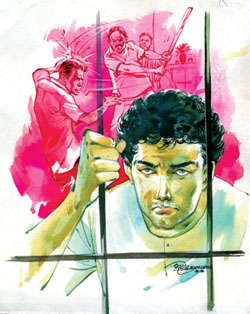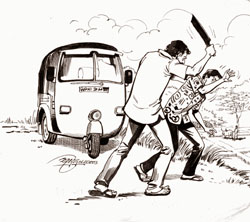
‚ÄėStemming the Crime Wave: The Role of Law and Society‚Äô
In the backdrop of the ever-rising incidents of
murder, assault, rape and other crime in all parts of the world,
addressing the crime rate and the prevention of crime have become a
prime concern for most societies in the world today.
In Sri Lanka too the occurrence of crimes
appalling to the human conscience every now and then has sent wake up
calls to the people as well as the law enforcement authorities of the
need for tangible measures to combat the crime wave.
Among the causes often cited for the rapid
increase in the crime rate are the inadequacy of legal provisions for
the effective prosecution of criminals, the inefficiency of the law
enforcement authorities and the lack of a comprehensive programme for
crime prevention on the part of the authorities.
Provided that a comprehensive legal framework and
a committed police service are essential to prevent crime, one cannot
also understate the role members of the public could play in addressing
the increasing crime rate.
In fact, the Criminal Procedure Code of Sri Lanka
contains specific provision imposing an obligation on the general public
to be vigilant and provide information regarding the commission of crime
to the relevant authorities.
What measures should really be taken to combat the
escalating crime rate ? Is it necessary to update our laws and introduce
new procedures for the fair and expeditious prosecution suspects ? On
the other hand, can the problem be solved by ensuring the efficiency of
law enforcement mechanisms ? What is the responsibility of the society
and the ordinary masses in bringing the culprits to justice and in the
prevention of crime ?
Take sometime to ponder over the above issues as
we take up ‚ÄėStemming the Crime Wave: The Role of Law and Society‚Äô on
Daily News Debate from this week. Send in your contributions (in
750-1,000 words) to ‚ÄėDaily News Debate‚Äô, Daily News, Associated
Newspapers of Ceylon Limited, PO Box 1217, Colombo, or via e-mail to
[email protected] before June 30, 2007.
##############
Society can play a major role in minimising crime
D. H. Sathischandra
 CRIME PREVENTION: The debate seeks to discuss the role of Law
and Society in stemming crime. The two aspects are interlinked and
reinforce each other. Since the issue discussed is vast and complex,
this article will focus on the aspect of society primarily. CRIME PREVENTION: The debate seeks to discuss the role of Law
and Society in stemming crime. The two aspects are interlinked and
reinforce each other. Since the issue discussed is vast and complex,
this article will focus on the aspect of society primarily.
It is necessary, at the outset to define society to give justice to
the issue discussed. Society should be defined to include our society,
society in other countries, and the international community. What happen
in society in other countries and at the international level have an
impact on our society.
The causes of crime are many and varied. They vary from society to
society. Sri Lanka’s situation is made more complicated by the ongoing
ethnic conflict. Causes of crime in Sri Lanka could be discussed at both
the fundamental and practical levels. Fundamentally, one reason for
increase in crimes is the decline and erosion of ethical and religious
values.
Social exclusion through lack of opportunity, poverty and various
forms of discrimination too leads to crime. Our inability to resolve
conflicts amicably and peacefully is another factor.
Causes of crime, at the practical and empirical level, include
proliferation of illegal firearms and light arms, increase in underworld
activity and increased availability and use of drugs and narcotics.
Firearms procured and used by entities other than the government are
illegal. Proliferation of illegal firearms is attributed to procurement
of arms by the LTTE, local production of firearms by people and
desertions from the army with their firearms.
The LTTE procurement of fire arms is facilitated by the international
environment relating to the manufacture and sale of firearms. There is a
demand for arms for defence purposes from countries around the world.
This has given rise to manufacture of and trade in fire arms. For
some countries it has become a significant source of foreign exchange.
Further in pursuance of their national interest, some countries
supply arms to friendly countries to achieve their national objectives.
Although there are restrictions on arms sales, procurement of arms by
armed groups in various countries is possible through various ways and
means.
Much could be done at the society level to minimise the incidence of
crimes. There are both long-term and short-term measures. As a long-term
measure there is a need to arrest the decline of religious and ethical
values in society. Throughout history there have been some principles
that govern human growth and happiness.
They are guidelines for human behaviour that are proven to have
enduring permanent value. They include fairness, honesty, integrity,
humility, fidelity, temperance, human dignity, service courage, justice,
patience, industry, simplicity and modesty. They are the foundation for
happiness and success.
They are part of every major religion and ethical systems. In recent
times the emphasis has shifted somewhat to a new paradigm called
‚Äúpersonality ethics‚ÄĚ. It is now believed that success could be achieved
through personality growth, acquiring certain attitudes, behaviours,
skills and techniques.
Human and public relations techniques and positive mental attitude
are two aspects of personality ethics. These elements of personality
ethics are beneficial and even necessary for success.
But we cannot be truly successful, if our character is flawed and our
conduct is not governed by the enduring principles of character ethics.
These principles will bring about changes in mind and heart and
eventually contribute to minimise crimes.
The government has recognised the need to develop character ethics
among the citizens. It has launched and promoted programs in various
fields to achieve this objective.
Under the aspect of law the key institutions are the legislature,
judiciary, police and the prisons. If the role of these institutions are
not effective what could be achieved at the society level would be
limited. Prisons for example are responsible for punishment and
rehabilitation.
At present there are problems of effectiveness in both these areas.
Consequently, the recidivity rate in Sri Lanka seems to be high. If the
prisoners are not properly rehabilitated, society will find it difficult
to integrate them into its fold.
At the society level there is also a need for change in the attitude
of people towards prisoners to achieve successful integration.
Leaving rehabilitation to the prison system alone would not be
sufficient. While the emphasis on education and rehabilitation has to be
strengthened, mechanisms to report on any misconduct, unethical or
illegal behaviour in prisons should be put in place. At the society
level independent civilian organisations to oversee education and
rehabilitation system appear to be necessary.
In the past two three decades the private sector has developed
considerable know how in crime prevention. Private security agencies
have emerged throughout the country. They have developed measures for
preventing crimes at firms and work places.
The potential for public and private partnerships for crime
prevention could be explored. In Sri Lanka many crimes take place
between people who know each other. It may be possible to moderate some
of the petty disputes and inter personal violence within families by
strengthening government social support schemes already in operation and
extending their coverage.
Disputes between families in villages and even in cities brew over as
period of time. People in the neighbourhood become aware of these
conflicts. Village level vigilance committees need to inform village
peers, religious leaders and law enforcement authorities before
conflicts erupt in violence and crimes.
Peace committees or Samatha Mandalayas have to be proactive to settle
these disputes and should not wait till conflicts are referred to them
for action.
In some countries firearms held by civilians outnumber those held by
security agencies by a factor of six according to studies. The situation
in Sri Lanka with regard to small arms and light weapons proliferation
is high according to studies.
Action is needed at domestic, country and international level and by
the UN to curtail the proliferation of fire arms. In Sri Lanka the
problem will be easier to tackle, if a lasting solution to the ethnic
problem is found.
#####################
Spread Buddhism’s noble and peaceful message
Ranjan Amarasinghe
Economic ills: The steep increase of crime rate in the recent
past in our country poses a grave challenge not only to law enforcing
authorities but also it has a negative impact on stabilizing democratic
tenets which are enshrined in our very constitution.
It is imperative that law enforcing authorities such as judiciary and
the police forces are mobilized in full gear to face any threats to
human life and property, which if not remedied swiftly and sternly, will
have a damning effect on the well-being of our citizenry and good
governance.
Therefore the paramount importance of stemming the tide without
allowing it to imprint its foot print in our social fabric which would
give a carte blanche to lawless elements to have a field day, cannot be
underestimated taking into account its probable mind shattering
consequences.
Notwithstanding our proud record of being the beneficiaries of an
ancient civilisation which was more or less influenced by the precepts
of Buddhism, spreading its noble and peaceful message of loving kindness
and compassion throughout the country, was eroded significantly after
its subjugation to foreign rule very specially to British who too like
their predecessors plundered our resources without an iota of
conscience.
Furthermore they were instrumental in introducing new values, based
on materialism so much so that acquiring of wealth by any means, was
considered quite pardonable, specially if the natives were amicable to
adept to their way of life.
In this context it is no exaggeration that a small percentage of
natives who opted to convert to Christianity, specially with a view to
better their condition were able to make headway in their respective
professions or trade.
In a Third World country like Sri Lanka in which abject poverty is
rampant, the introduction of open economy in 1977 as a panacea for all
our problems, gave an impetus to materialism in which puss-button
civilization satiating cravings instantly like making instant coffee or
instant milk was given a high priority.
Unlike in our ancient agrarian society, in which harmonious
relationships were nurtured as a farmers were bound to assist one
another at the time of need, the new millennium marked striking changes
in which private ownership and personal liberty took a center stage.
In this set-up going-up in social ladder as an individual was given
prominence. thus accruing of wealth as a status symbol took precedence
over our pristine values. Hence the wealth of a person in a society has
had a direct bearing in gauging is value in our social stratification.
It explains why there is an increasing craving for wealth, accruing
of which in most instances is done by many unscrupulous people, by not
so justifiable but crooked methods.
It is in this set-up there is a tendency for criminal elements to
actively involve in their cause, well-knowing that the wealth is
worshipped as a demi-god which would give them unlimited power to
accelerate their materialistic instincts.
Although it is naive assumption to consider that open economy is the
prime culprit for all our social and economic problems as with the
introduction of globalisation it has gained a high degree of acceptance
throughout the world.
However, ironically the level of poverty in many Third World
countries has gone up dramatically, in spite of World Bank and
International Monetary Fund predicting otherwise, necessitating a New
Economic Order which is more equitable and just addressing the
grievances of Third World countries.
In short the expectations of these Third World countries in
eradicating the spate of criminal activities such as horrendous murders,
rape and robberies from their soil would remain a utopian dream, as far
as they do not record a significant degree of development in their
respective economies.
In Sri Lankan context, the decades old ethnic strife has a strong
impact on criminalisation of our society as we have willingly or
unwillingly become immune to atrocities which have become a ‚Äúnon-event‚ÄĚ
due to their frequency.
This adverse climate is an ideal ground to spawn the seeds of violent
confrontation which is manifested in numerous forms threatening
demonically our very existence.
The recently phenomenon of kidnapping wealthy business magnates in
order to demand ransom money and brutal political killing of civilians
can have a negative impact as they are rightly considered as a violation
of basic human rights safeguarding of which is entrusted to Law
enforcing agencies of these democracies.
Therefore the State which represents the will of the common people is
duty bound to maintain Law and Order of the country even under most
difficult circumstances.
Any democratically elected government cannot and should not abrogate
their cardinal responsibility of safeguarding the basic rights of their
citizens without any discrimination such as race, caste or religion,
which will go a long way in stabilizing a peaceful and harmonious
atmosphere in our trice-blessed country.
######################
Be on alert and extend full support
S.T. Arasu
 TOUGHER LAWS: The time is marching on and the crimes too
marching fast steadily, now in our country. It’s a pity and shame, that
deadly crimes are on the increase in recent times, than before, and
nothing special, or substantial action had been done so far, to erace,
or halt these deadly crimes. these days, the crime wave is rapidly
increasing in an alarming manner and the people have to live in fear,
pain, tension and anxiety. TOUGHER LAWS: The time is marching on and the crimes too
marching fast steadily, now in our country. It’s a pity and shame, that
deadly crimes are on the increase in recent times, than before, and
nothing special, or substantial action had been done so far, to erace,
or halt these deadly crimes. these days, the crime wave is rapidly
increasing in an alarming manner and the people have to live in fear,
pain, tension and anxiety.
Daily, the topic of the day in the local media is the deadly crime
news occurred somewhere, giving horrid details of several crimes, such
as multiple murders, arsons, rapes, child abuses, robberies, gangster
riots, cold blooded killings, abductions or kidnapping of somebody
innocent and so on.
I do think, that in the first instance, in order to arrest, or
contain the crime wave, the state’s responsibility is to enforce, or
introduce much tougher laws than today, that we experience and the
security of the general public must be established, by the guardians of
the law enforcement (Police Force), which must be much strengthened
early with proper training and coaching, to face this delicate, vital
issue to save the nation !
Secondly, the community or society, should play a very prominent
role, to help or assist the police force, in stemming the tide of the
deadly crimes. simultaneously, public vigilance is very essential, to
prevent any type of terrorism, or crimes, that matters.
For this steady, work-out, there must be the vigilance committees in
all areas, (separately) come back to function again as in those days, to
help or assist the security forces - (Police, Army, Navy and Air force).
The vigilance committees must care, comfort and guide the people of
the areas on this matter. They should co-operate and co-ordinate, with
the grama niladaris and the police stations personnel of their
respective places, to have good link, friendship and understandings,
when and wherever necessary.
Then, finally, the youths and children of the areas too should take
part in stemming this worst crime wave. Yes, they should be aware join
their parents, guardians and elders in trapping the culprits, for the
protection and security reasons, by being alert, or vigilant always.
The parents, teachers and priests (of all religions) of the
respective areas, should advise and guide the youths and children in
this connection, to arrest the criminals who are unscrupulous elements,
or persons.
This a delicate, vital issue, concerning every citizen of this
country and it’s our bounden duty. to be on alert, to extend every
support in order to wipe out the crimes, that are spreading all over our
country. Let us all unite together, to save our nation from this
alarming sad situation that we are facing so badly today. |

